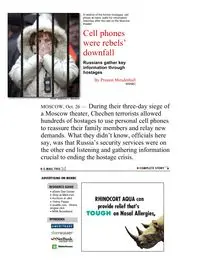
Cell Phone dangers PDF
Preview Cell Phone dangers
A relative of the former hostages, cell phone at hand, waits for information Saturday after the raid on the Moscow theater. Cell phones were rebels’ downfall Russians gather key information through hostages By Preston Mendenhall MSNBC MOSCOW, Oct. 26 — During their three-day siege of a Moscow theater, Chechen terrorists allowed hundreds of hostages to use personal cell phones to reassure their family members and relay new demands. What they didn’t know, officials here say, was that Russia’s security services were on the other end listening and gathering information crucial to ending the hostage crisis. • eDiets Diet Center • Shop at B&N.com • Auctions at uBid • Yellow Pages • lavalife.com Where singles click • MSN Broadband SECURITY OFFICIALS HERE who helped plan the special operation that freed over 700 hostages but killed dozens in the process said Saturday that the relative freedom the rebels gave their hostages proved to be their downfall. One senior security source, who declined to be identified, said the FSB, a successor to the Soviet-era KGB, identified the dozens of phone calls made by hostages immediately after the attack as an important link to the inside of the theater. The FSB encouraged families of hostages to make themselves available around the clock at a special coordination center near the theater, where 24-hour support and information for the relatives were also provided. Advertisement When calls from hostages came, family members first established whether any terrorists were near the person placing the call. Family members and security officials said the phone would be passed to a security officer, who would ask “yes and no” questions to confirm key information about the terrorists — careful not to draw the hostage into a conversation that would be suspicious to the Chechen fighters. After the rescue operation ended Saturday, security officials credited cell phones with providing information on the number of terrorists, their weapons arsenal and the location of hundreds of hostages spread throughout the multi-storied theater complex. “The phones were our little secret,” one official said, “and through them we knew everything that was going on inside.” CELLULAR RALLY During the first two days of the attack, it was the rebels, and not the government, who appeared to be most deft at exploiting the dozens of phones being shared among hostages. On Thursday, several family members received calls from their relatives, urging them to join a protest against the war in Chechnya. About a hundred relatives gathered near the theater echoing the rebels’ demand that Russia end its battle for the breakaway region 1,500 miles south of Moscow. However, many said they believed the terrorists had forced the hostages to make the calls. While cell phones were an unexpected boost for their operations, the security services began mapping out a raid on the Moscow Bloody siege in Moscow • WP: Kremlin tightens grip on media • Rebels' downfall: phones • NBC: BZ's history • Q&A: Implications theater within hours of the Wednesday terrorist attack. On Saturday, a sleeping gas was used to render the rebels unconscious. Russian media reported that the gas was spread throughout the building through the theater’s ventilation system. Underneath the structure, Moscow sanitation workers led special forces troops to tactical points used in the raid, according to security officials. But it was the cell phones that yielded the most information. Even the rebels themselves were subjected to eavesdropping. When President Vladimir Putin on the first day of the siege declared that “foreign terrorist centers” had aided the attackers, security officials say the Russian leader was relying on information gathered from the tapped phones of the rebels, who officials say made several phone calls to apparent supporters living abroad. • Newsweek: Still at war • Latest news
